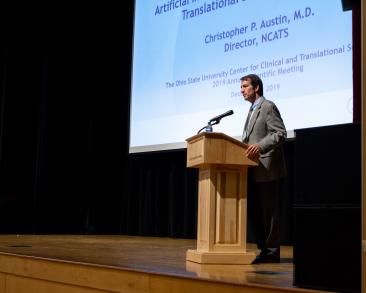2019 Annual Scientific Meeting
The CCTS and Nationwide Children's Hospital hosted the 2019 Annual Scientific Meeting on Dec. 3, 2019, with a focus on artificial intelligence and machine learning in translational and human health. Artificial intelligence and machine learning are impacting clinical and translational science, and this event gave researchers, clinicians, students and other partners the opportunity to learn from different speakers about the effects of that impact.

Speakers with distinguished backgrounds in the public and private sector of translational research, artificial intelligence, machine learning, process improvement, clinical research and biomedical informatics provided a dynamic environment that led to good discussion and networking around research issues in AI and ML.
The keynote was delivered by Dr. Christopher Austin, MD, Director of the National Center for Advancing Translational Science (NCATS). Dr. Austin focused generally on the need to catalyze innovation in translational and clinical science research. The meeting also included an energetic and interactive poster viewing and award session.
Below is a video recap of the day's events.